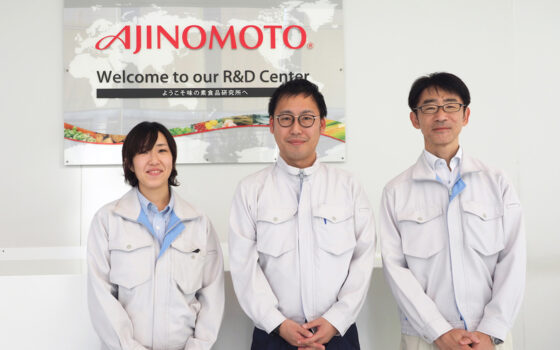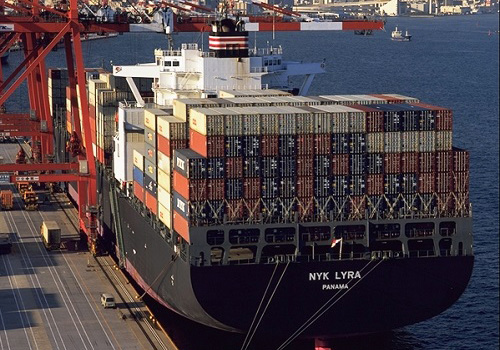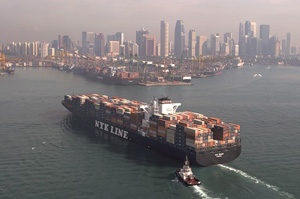
- Supporting Manufacturing


The ocean liner industry has faced a number of harsh conditions under the backdrop of a turbulent drop in market conditions chiefly caused by many large, newly built containerships entering the market at around the same time, a rise in fuel prices, and the 2008 financial crisis. As a developer of comprehensive logistics focused on maritime transport in locations around the world, NYK LINE has advanced projects that aim to streamline the pillars of the liner industry -- ships, staff (organizations), and containers -- in order to enhance the company's competitiveness amidst severe global competition. The streamlining of ships and staff (organizations) began with the creation of the world's largest route network, route restructuring, and route optimizations through alliance expansion over the past few years. Next came an initiative to enhance container movements -- i.e., the EAGLE Project -- the goal of which was to optimize container usage based on demand forecasts.
Through container yield management*, the EAGLE Project seeks individual container profitability. NYK LINE is currently transporting about 750,000 TEUs of containers for an annual transport volume of around 3.5 million TEUs per year. One TEU corresponds to the size of one 20-foot container. Thus, a slight increase in the profitability of each individual container can have an enormous improvement on the bottom line.
A major challenge of the liner business for NYK LINE was the silo-ization ** of various operations departments caused by those in charge of exporting, importing, and cost management being scattered around the world. With individual departments trying to pursue optimization from their own perspectives, the accumulation of these separate goals did not always result in an overall optimization. In order to overcome this problem, the EAGLE Project team (and other project teams as well) was established by gathering members from various departments. Additionally, to incorporate external opinions in its projects, NYK LINE invited Kozo Keikaku Engineering, which had collaborated on various projects in the past, to participate in the planning as an expert in operations research*** technologies.
"It is fundamentally impossible to control the external environment (market fluctuations). The point of the EAGLE Project is for each department to pursue the utmost limit of what can be controlled and improved to minimize the impact of these fluctuations. The goal of this project is very simple: to use our 750,000 TEUs in the most logical and efficient way. In order to achieve this, we must remove the departmental silo-ization and change the way individual employees think so that they can select the most beneficial option for the company as a whole." (NYK Group South Asia former general manager Yasuki Iwai)
* Yield management is a management technique used to improve profitability by selling a product at the optimal time and price based on demand forecasts. This technique is used in many cases where the supply amount of the product is already determined, such as in the hotel and transportation industries.
** Silo-ization occurs when an organization's business processes, systems, etc. are self-contained without coordination with other departments, leading to isolation.
*** Operations research is problem-solving technique that attempts to find optimal solutions for complex problems in reality using mathematical and statistical models and simulations.
The EAGLE Project was divided into multiple task forces. Kozo Keikaku Engineering was involved in one of them -- to optimize container transportation planning and develop an associated company-wide system.
Containers are being moved around the world in response to constantly changing demand due to the fluctuating amount of exports and imports in each location, causing a surplus or shortage of containers in various locations. Because of this, empty containers had to be forwarded from one place to another to address this imbalance, incurring maintenance and management expenses of about ¥30 billion per year.
Using operations research techniques, Kozo Keikaku Engineering developed a system in conjunction with NYK's existing core route system OSCAR. As a result, NYK LINE was able to assess current situations and forecast future container demand using analyses of previous container transport situations and marketing performances at each location worldwide. Currently, a system that can create reasonable container transportation plans to avoid the wasteful forwarding of empty containers is under construction.
With regard to the points improved upon by the construction of this system, a representative of NYK LINE had this to say:
"Data analyses of the current situation are indispensable for predicting the future. However, when collecting all these minute bits of data from the field, the efficacy of the prediction did not increase in proportion to the workload. To solve this problem, Kozo Keikaku Engineering developed a system based on a statistical algorithm. The system is able to perform a macro analysis and provide a forecast through use of data on containers flowing in and out of broad regions of Asia and North America. Using this logical system and numerical inputs, the system calculates container plan values using container demand, flow, and even the customer return proportion. This is then reflected in future stock data. In the past, predictions would vary depending on the intuition and experience of each supervisor, but through the logic formulated by Kozo Keikaku Engineering, we can now make accurate and objective estimates. Until now, we were only able to forecast container demand for three weeks ahead and only in Asia, and there were frequent surpluses and shortages. Armed with only those short-term predictions, our only possible response was to order from expensive supply centers nearby. By utilizing our new system, we are now able to predict with significant accuracy 10 weeks in advance around the world. We can now transfer empty containers from much cheaper overseas territories (distant continents), or anticipate demand several weeks in advance and leave those empty containers where they will soon be needed. We are currently developing an inventory plan based on these forecasts.
The great value of this system is how easy it is for NYK Group employees to use, read, and understand. The overall data balance is fantastic. Even with such a plethora of data, employees will find it difficult to follow if reports are too complicated. Currently, the members responsible for creating our global inventory plan are able to place their faith in the numbers that appear in those reports and form a plan by using them." (NYK Group South Asia senior manager Kenichi Michida)

In order for this revamped optimization system to permeate the company, the EAGLE Project supervisory group based in Singapore, and the EAGLE Team, comprising employees in North America cooperating with one another, traveled extensively throughout the United States to visit individual sales representatives at each division and review their reports. "Releasing accurate numbers means nothing unless they are actually used in the field. The report results indicated cases in which individual business outcomes led to losses on a global level. In such cases, we may suggest the need to review the acceptance of orders. Of course, some sales representatives were reluctant to change their ways, fearing that it might harm their own business results. However, our team issued reports individually and continued to patiently review existing sales policies while looking at customer relationships. Our project team was able to persuade these sales representatives by using the reports as a basis, since the situation was made so clear by looking at the objective numbers presented by this system. In that sense, it can be said that this system was successfully designed to be used by each individual." (Senior Manager Kenichi Michida)
Thus, this enabled decisions such as refraining from taking orders that could have a negative impact on the earnings of the entire company, even though the orders would look good on a personal level.
A major achievement of this project is that individual sales representatives stopped considering only short-term personal operating profits and instead began to take a more long-term, comprehensive view, asking questions such as "How do I increase the number of customers?" and "How can this profit the entire company?" when it is difficult to decline an order due to the relationship with the customer. (Senior Manager Kenichi Michida)
Currently, the EAGLE Project has begun worldwide, and NYK LINE expects the reduction in costs to be nearly ¥10 billion. In addition, the bird's-eye view of the entire organization afforded by this project has led NYK LINE to discover potential new areas of improvement.
"When looking at container movement on a global scale, sometimes there is a surprising movement -- for example, when a container goes from point A to point B and is then transported to point C from point B, when other groups of containers are being moved directly from point A to point C. In this case, the supposition is 'Wouldn't it be more efficient to transfer them from point A to point C directly?' I believe that in the future we will be able to recognize inefficient movements on the system side and indicate more efficient solutions.
This is an area where there had been too many variables to consider and no other company had been able to penetrate due to the necessity of predictions and complex models of optimization. It is necessary for us to work actively with people who possess expertise and knowledge of logic construction like the professionals at Kozo Keikaku Engineering in order to solve such complex challenges." (Senior Manager Kenichi Michida)
"Kozo Keikaku Engineering helped us in terms of both constructing the task force and coming up with the concept. We are grateful to them for being our business partner and teaming with us to conduct trials together. With all the knowledge we have jointly accumulated, I look forward to continually working with Kozo Keikaku Engineering, as a project member and symbolically lessening the distance between Tokyo and Singapore." (General Manager Yasuki Iwai)
Interview date: January 2014
Marketing Strategy & Overseas Dept.
TEL:+81-(0)3-5318-3091
E-mail:i-marketing@kke.co.jp
Web:http://www4.kke.co.jp/orsim/